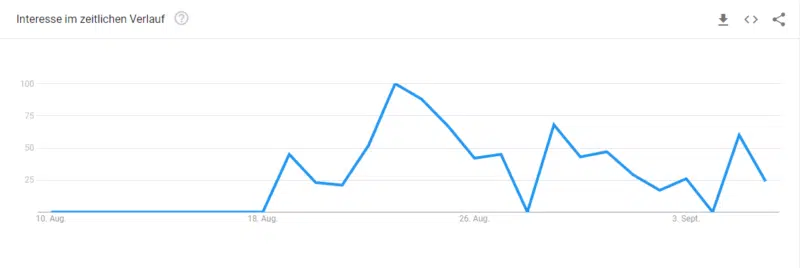Google’s helpful content update: A critical recap
The widely covered algorithm update finished rolling out, yet the big bang never happened. Here’s how SEOs can deal with the aftermath.
Google’s helpful content update officially finished rolling out Sept. 9. Now it’s important to reflect on the update, our initial assumptions and its impact on the SEO industry.
Fellow SEOs (e.g., Lily Ray, Glenn Gabe, Marie Haynes, Johannes Beus) have done a great job interpreting Google’s announcement and processing what happened on Twitter and their blogs.
Google’s announcement aroused great expectations within the SEO community. But the “big bang” never happened.
The update’s impact was only felt in a few website categories, such as ringtones, coding and lyrics pages. Its overall impact was relatively small compared to other algorithm updates.

Critical reflection and alignment between theory and practice
First, reviewing the interpretations and expectations derived from Google’s announcement and the eventual results makes sense.
Here are the core statements from Google regarding the helpful content update and my theories, which were largely derived from them.
- Focus on people-first content.
- The update was sitewide, which should affect not only individual content but entire websites’ content.
- Observation: If you look at the strong loss of visibility for the few domains that are supposedly negatively affected by the update, you can assume a website-wide penalty.
- The recurring reference to expertise suggests that there should also be an update with E-A-T. It was assumed.
- Observation: Does expertise play a major role in ringtones and lyrics? I do not think so! According to the analysis of valued colleagues, the coding pages were more about copied content (i.e., duplicate content) and not about a lack of expertise.
- Google also wanted to devalue automated content, which would be an answer to the expected flood of AI content.
- Observation: Do you use AI tools to generate text for topics such as ring tones, coding or lyrics? That doesn’t really make sense either.
So many assumptions and information from Google have not been observed to this day.
According to Google’s Danny Sullivan, there may be more to come in connection with further updates.
Another scenario is, therefore, theoretically possible.
Like Hummingbird, the helpful content update is fundamental to the ranking algorithms that the effects can only be seen over a long time, possibly even years.
As of now, not much has really happened, which brings another assumption into play.
Immediately after the helpful content update, Google started rolling out a two-week core update. In contrast, there is only one tweet and short undetailed general info about it, which is typical for Google. I don’t think that’s a coincidence.
No big explanation. No outreach.
Sullivan also remains vague on Gabe’s question of whether there is a direct connection between the September Core Update and the helpful content update.
Two theories about this:
- Google is not satisfied with the results of the helpful content update and would like to make further adjustments, which, as mentioned by Sullivan, only unfold the full effect of the helpful content update in combination.
- Google would like to calm the emerging criticism of the communication and the low impact surrounding the helpful content update and steer the focus in a different direction.
Get the daily newsletter search marketers rely on.
See terms.
The helpful content update was a well-executed PR campaign
Regardless of how the past and future influences from the helpful content update are to be evaluated, one thing has to be said – the communication surrounding the update was a prime example of a well-planned and executed PR campaign.
First, you'll wonder: Why does Google need PR at all?
Like almost every company, Google has communication goals pursued through marketing and PR. Search is the most important product for Google; therefore, PR should be done for it.
The following aspects indicate that the helpful content update is also a professionally designed product PR campaign.
- The update's name is similar to the Page Experience or Mobile Friendliness updates but different from the core updates, Hummingbird, Panda or Penguin. It also describes explicitly what it is about which works better in terms of PR than a meaningless name. As a result, the implicit main message "Google search is becoming even more helpful" is conveyed in almost every message.
- The update was announced by Google ahead of time. In most cases, updates are not communicated at all or only shared during or after the rollout. However, PR campaigns for product (re-)launches always require a lead time.
- High-reach and influential SEOs were informed exclusively before the official announcement. In PR outreach, this is often a successful method to motivate influential media and influencers to report on something.
- Google gave pretty specific recommendations for the update on what webmasters should do, which hasn't been the case with most previous updates except for Penguin or Page Experience. This shows that this supposed PR campaign was also aimed at a second important target group besides the SEO industry – the website operators.
The helpful content update was the main focus of the SEO industry and media beyond for over two weeks. Hundreds of thousands of articles, reports and countless social media posts have spread the word that Google searches are becoming more helpful.
Media coverage shows that the update is a major PR success for Google. You can find over 180,000 pieces of content in Google searches that deal with the update, with 18,900 of them in Google News worldwide.

The effects of this can be understood in Google Trends:

These patterns which speak for a professionally designed PR campaign, in combination with the manageable effects on Google searches, support this assumption.
Google pursued two goals with this PR campaign:
- To convey the message "Google search is now even more helpful" to the world.
- To get webmasters, publishers, and SEOs to produce less junk, Google has to crawl. Google faces the challenge of making its crawling and indexing resources as efficient as possible. On the other hand, if more and more garbage is flushed onto the Internet due to the AI revolution in content production, among other things, Google will find it difficult to keep up.
A reminder for the SEO industry
The Google helpful content update is a prime example of a professionally conducted product PR campaign from which you can learn a lot.
For us SEOs, the realization remains that we are important stakeholders for Google for the dissemination of their company messages.
Here, Google shows a shift in PR and communication strategies from recent years and seeks proximity to influential personalities from the SEO industry.
- SEOs are invited by Google.
- Google shoots videos with SEOs.
- Google gives SEOs exclusive information upfront.
Relationships are built.
Back in the day, SEOs used to be rather unpopular with Google because many intended to game the search results. Now, Google seems to see the SEO industry as a multiplier for its own news and messages.
SEO colleague Brodie Clark sees it similarly:
I'm not saying that Google publishes false information here, but of course, they have their own agenda to present their products in a good light. And the commitment to include us SEOs and the industry media in the communication is always an end.
I was enthusiastic about Google's announcement of the helpful content update and published it immediately with great expectations. But more and more, my enthusiasm gave way to the sobering realization that a lot of PR was also involved.
The SEO industry should be aware of this and critically deal with the information from Google. The next time a "major" update is announced in advance, we should balance emotional enthusiasm with rational thinking and remain objective. There is a business relationship between Google and SEOs, not a friendship, so we should keep it that way.
Opinions expressed in this article are those of the guest author and not necessarily Search Engine Land. Staff authors are listed here.
New on Search Engine Land
Google’s helpful content update: A critical recap
Google launched support for Performance Max campaigns in ad scripts
Webinar: Make your marketing stand out this holiday season
Google gives publishers new ways to control their first-party data
Google has introduced bundled ad recommendations







